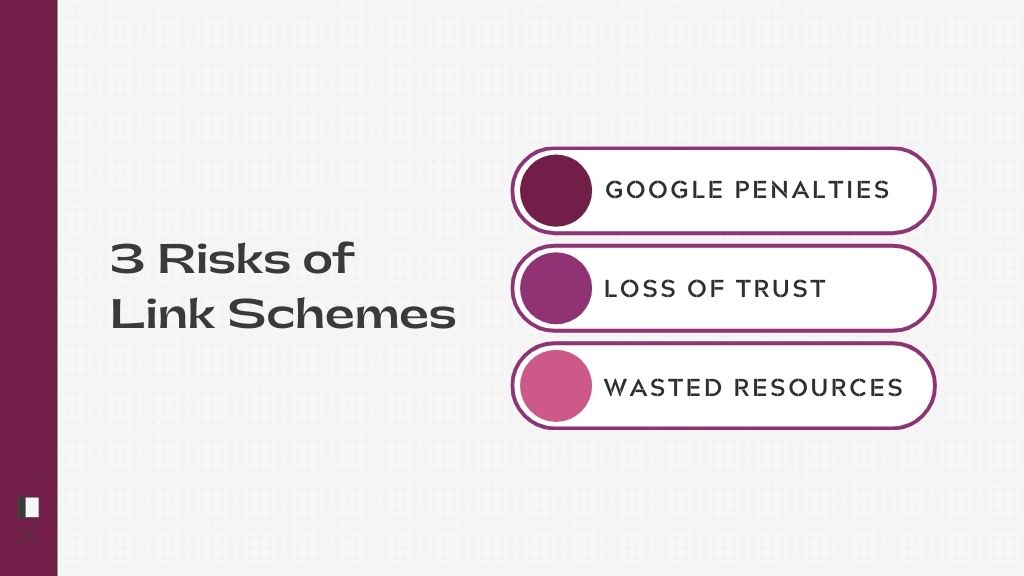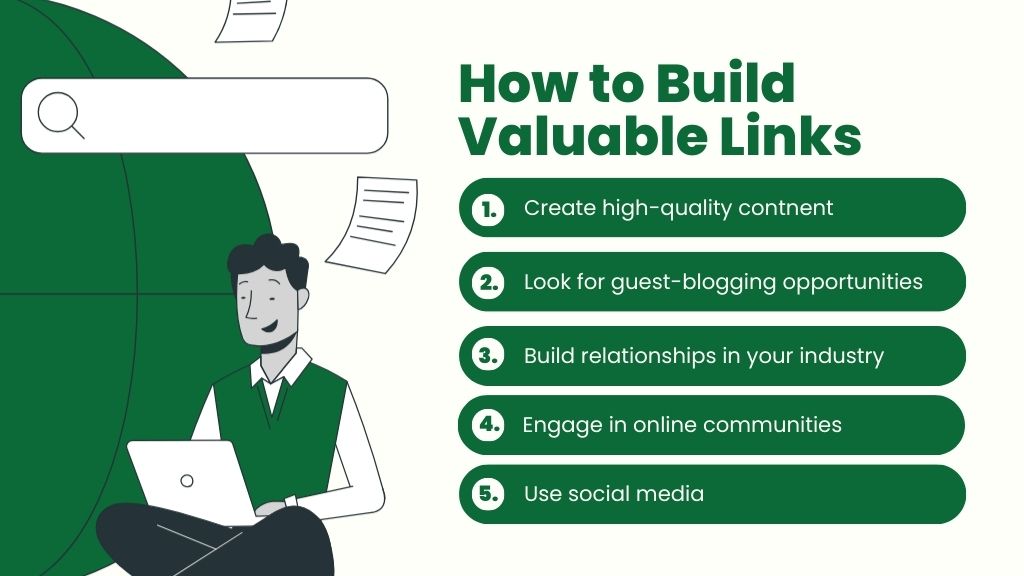Why You Should (Generally) Stay Away from Link Schemes

Everyone, especially businesses, wants their website to rank high on Google and Bing. One strategy that some marketers use is link schemes, which involve buying or selling links to manipulate search engine rankings.
While this might seem like a quick way to boost your site’s visibility, it’s often a risky game that can lead to more harm than good. In this post, we’ll explore why you should generally avoid link schemes, when it might be okay, and how to ensure your link-building efforts provide genuine value to your audience.
In this article:
- What are Link Schemes?
- The Risks of Link Schemes
- When Link Schemes Might Be Okay
- How to Build Valuable Links
- Technical Tips for Safe Link Building
What are Link Schemes?
Link schemes are any practices that involve creating backlinks to your website in a manipulative way. This can include:
- Buying or selling links for SEO purposes.
- Excessive link exchanges (“I’ll link to you if you link to me”).
- Using automated programs or services to create links.
- Building links through low-quality directories or bookmark sites.
These practices violate Google’s Webmaster Guidelines and can result in penalties, including a significant drop in your search rankings or even removal from search results altogether.

The Risks of Link Schemes
- Google Penalties: Google is very strict about link schemes. If their algorithms detect unnatural link patterns, your site could be penalized, which means losing all the hard-earned rankings.
- Loss of Trust: Search engines strive to provide users with the most relevant and trustworthy content. If your site is caught using link schemes, it can lose credibility not only with search engines but also with your audience.
- Wasted Resources: Buying links can be expensive, and if your site gets penalized, all that money is wasted. Plus, recovering from a penalty can be a time-consuming and costly process.
When Link Schemes Might Be Okay
While link schemes are generally a bad idea, there are situations where buying or selling links can be acceptable. The key is to ensure these links provide real value:
- Sponsored Content: If you’re paying for a link in the context of a well-written, relevant article that provides value to readers, it’s less likely to be seen as a manipulative scheme. Just make sure to disclose that it’s a sponsored post.
- High-Quality Guest Posts: Writing guest posts for reputable websites can be a great way to earn backlinks. Ensure your content is valuable, relevant, and not solely focused on the link itself.
- Editorial Links: If a high-authority website naturally links to your content because it’s genuinely useful, this is a good, natural link. These are the kinds of links Google loves.
How to Build Valuable Links
Instead of engaging in link schemes, focus on building links that genuinely add value to your site and your audience. Here are some tips:

Create High-Quality Content
Content is king. High-quality, relevant, and engaging content naturally attracts backlinks. To start, identify topics that resonate with your audience by researching what’s trending in your industry.
Use tools like Google Trends, BuzzSumo, or Answer the Public to find popular topics. Write comprehensive articles, create insightful blog posts, produce engaging videos, or design eye-catching infographics. Make sure your content is well-researched, informative, and offers a fresh perspective to stand out from the competition.
Once your content is created, promote it across various channels. Share it on your social media profiles, email newsletters, and relevant online communities. Encourage your readers to share your content if they find it valuable.
By consistently producing and promoting high-quality content, you increase the chances of earning natural backlinks from other websites that find your content useful and worth referencing.
Guest Blogging
Guest blogging is a powerful way to earn backlinks while reaching a broader audience. Start by identifying reputable sites in your niche that accept guest posts.
Look for websites with good domain authority and engaged readership. Use search queries like “your niche + write for us” or “your niche + guest post guidelines” to find potential sites. Once you have a list, read through their guest post guidelines carefully and familiarize yourself with the type of content they publish.
When writing your guest post, ensure it is of high quality and provides real value to the readers. Focus on delivering insights, tips, or information that the audience will find useful. Include a natural, relevant backlink to your site within the content or author bio.
After submitting your post, engage with the audience by responding to comments and sharing the post on your social media channels. This not only helps build relationships but also increases the visibility of your guest post and your own website.
Build Relationships
Building relationships with influencers and other bloggers in your industry can lead to natural backlinks and collaborative opportunities. Start by identifying key influencers and bloggers within your niche.
Follow them on social media, engage with their content by liking, commenting, and sharing, and join discussions on platforms like Twitter, LinkedIn, or industry-specific forums.
Once you have established a connection, look for opportunities to collaborate. This could be through co-authoring articles, participating in interviews, or even hosting joint webinars.
By building genuine relationships, you increase the likelihood of receiving backlinks as these influencers and bloggers may naturally link to your content when it is relevant to their audience. Remember, relationship-building is a long-term strategy that requires consistent engagement and mutual support.
Engage in Online Communities
Participating in online communities such as forums, social media groups, and Q&A sites like Quora can help you earn valuable backlinks. Start by joining communities that are relevant to your industry or niche. Spend some time observing the type of questions and discussions taking place to understand the community’s needs and preferences.
Once you’re familiar with the community, start contributing by answering questions, providing insights, and sharing helpful resources. When appropriate, link back to your own content that offers additional value or detailed answers.
Make sure your contributions are genuine and not overly promotional. By consistently providing value, you build credibility and increase the chances of community members linking back to your site.
Use Social Media
Sharing your content on social media platforms can drive traffic and increase the chances of earning backlinks. Start by creating profiles on popular social media platforms such as Facebook, Twitter, LinkedIn, Instagram, and Pinterest.
Tailor your content to fit each platform’s format and audience preferences. For example, use eye-catching images and concise descriptions for Instagram, while detailed articles and professional updates work well on LinkedIn.
To maximize your reach, engage with your audience by responding to comments, participating in relevant discussions, and sharing content from other industry leaders.
Use hashtags to increase the visibility of your posts and join industry-specific groups where you can share your content. By actively participating and sharing valuable content, you enhance your online presence and encourage others to link back to your site.
Technical Tips for Safe Link Building
- Analyze Your Backlink Profile: Use tools like Google Search Console, Ahrefs, or Moz to monitor your backlink profile. Identify and disavow any suspicious or low-quality links that could harm your site.
- Diversify Your Links: Don’t rely on a single source for backlinks. Aim to get links from a variety of high-quality, relevant websites.
- Focus on Relevance: Ensure the sites linking to you are relevant to your industry or niche. Irrelevant links can appear manipulative and may be flagged by search engines.
- Use Anchor Text Wisely: Avoid over-optimizing anchor text. Use natural language and ensure the anchor text is relevant to the content it’s linking to.
- Check for Spammy Links: Regularly audit your backlink profile for spammy or low-quality links. Use Google’s Disavow Tool to tell Google to ignore these links.
Sow the Right SEO Seeds
While it might be tempting to use link schemes to boost your site’s ranking quickly, the risks far outweigh the benefits. Google is getting better at detecting unnatural link patterns, and the penalties can be severe.
Instead, focus on building high-quality, valuable content and genuine relationships in your industry. By doing so, you’ll attract natural backlinks that improve your site’s SEO and provide real value to your audience.
Sign up with Link Genius today to streamline your outreach campaigns and maximize your backlink-building efforts. We’ve made it easier for you to find guest posting opportunities, create valuable content, and connect with potential link partners. Remember, SEO is a long-term game, and the best strategies are those that prioritize quality over shortcuts.
